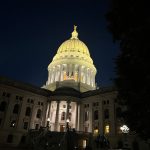Sublime Brahms sextets close Summer Evenings of Music
The Fine Arts Quartet brought in two guest performers to close out their summer season, performing energetic sextets at the Zelazo Center.
The Fine Arts Quartet closed their summer season Sunday evening with two rarely performed highly respected works – the two string sextets of Johannes Brahms. Fine Arts Quartet members violinists Ralph Evans and Efim Boico and cellist Robert Cohen were joined by violists Juan-Miguel Hernandez and Gil Sharon and cellist Niklas Schmidt. (Gil Sharon is better known on violin.)
Six players provide a very different experience than four. Brahms made the most of this combination. Passages contrasted the four highest strings with the four lowest – with the violists contributing to both. Themes carried by three balanced string players could be played on a bed of pizzicato accompaniment by others. Pairs of like players shared a section, but rarely doubled. “First chair” players often introduced themes, with particularly strong playing by violist Hernandez and cellist Cohen. Somewhat unfortunately, the two guests for the evening were assigned somewhat lessor roles. They blended well into the ensemble, but their individual contribution was less obvious.
With six players to work with, Brahms avoided the temptation to create a larger, more dramatic sound. Instead, he created themes of great beauty and motifs that added momentum without fireworks. Brahms was clearly differentiated from Beethoven as he created a relaxed atmosphere with subtle evolution within development, dance movements with subtle changes of emphasis, clever variations and themes and motifs which returned again and again to delight the listener.
The String Sextet No 1 in B flat major, Op 18 – is a sunny work. In the first movement, Cohen’s cello introduced a rich melody, followed by a descending figure in Evans’ violin. Then the ensemble broke into a casual waltz. An additional theme from the cello introduced a section with more energy climbing in pitch but not substantially in volume. The second movement introduced a theme and variations on a simple Hungarian Gypsy theme. The illusion of increasing speed was accomplished by increasing the number of notes to a beat through several variations. The scherzo third movement introduced a dance, but added accents to subtly change the rhythm. The trio section added a briefly madcap pace before returning to the opening dance. The rondo form of the finale returned the sextet again and again to a delicate melody. The energy of the finale is restrained – in the manner of a divertimento – until the close.
The String Sextet No 2 in G major, Op 36 drew its energy from a simple wavering motif that was introduced in the opening moments and reappeared in background and foreground again and again. A similar skittering theme appeared in the finale. Pizzicato strings were also generously woven into the work, especially in the second movement scherzo. These abstract themes were balanced by melodic themes shared by Evans, Cohen and Hernandez throughout the work.
The second sextet was interrupted briefly when a string broke on Hernandez’s viola. With a brief pause for an off stage repair, the sextet resumed to complete the first movement. Strings rarely break in a performance, but Brahms did assign the “first” viola a dramatic phrase in the this movement as Brahms encoded as cathartic reference to a jilted lover. This was the last of five Zelazo series appearances by Hernandez, who has been substituting for Fine Arts Quartet Nicolò Eugelmi since spring. He has brought enthusiasm and energy to all of his performances.
The Fine Arts Quartet will begin their 2013-14 Season on September 29. Those with current season seats will be able to renew their choices from the 2012-13 Season during the month of July. Three years of free subsidized concerts has helped to build a large audience. The Zelazo Center was nearly full on Sunday. However, tickets for the next season will be a modest $10 per concert. See UWM Fine Arts Quartet web page or call the box office at (414) 229-4308 for further information and to reserve future concerts. (The quartet’s website lists performance dates of September 29, November 10, February 2 and March 30. Check either website later this summer for program specifics.)























